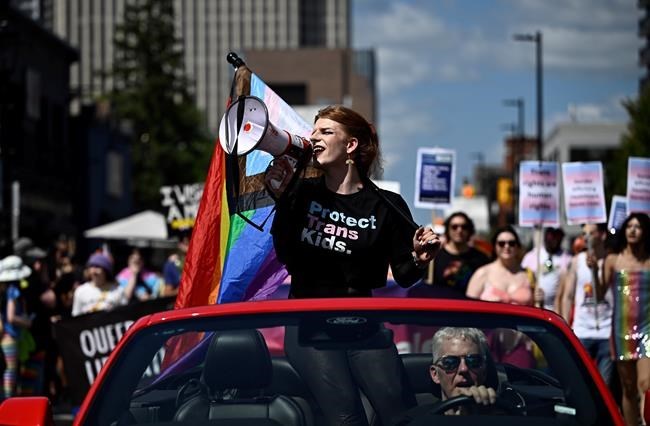
<p>Parade grand marshal Fae Johnstone calls out chants through a megaphone during the Capital Pride Parade in Ottawa, on Sunday, Aug. 27, 2023. Organizations across the country are gearing up for what they describe as the largest LGBTQ+ mobilization since the push for marriage equality. THE CANADIAN PRESS/Justin Tang</p>
April 24, 2024 - 1:00 AM
Organizations across the country are gearing up for what they describe as the largest LGBTQ+ mobilization since the push for marriage equality.
Fae Johnstone, president of the Society of Queer Momentum, says there will be rallies across Canada in May.
The group, in partnership with other organizations, is pushing for all levels of government to respond to a series of calls to action that include funding for LGBTQ+ social supports and programs.
The group has dubbed the campaign the Rainbow Week of Action.
Rallies will take place in Toronto on May 16, and in cities including Calgary, Edmonton, Ottawa on May 17. More events are set for other cities and communities.
Johnstone says their message is crucial now because "far-right groups and cynical politicians" have spread misinformation about the LGBTQ+ community to "fuel anger and division."
"It's time that we turn the tide. It's time that we lift up our voices and call for a more free and equal Canada for all of our families," she said.
Rallies will take place in a dozen large cities and towns, Johnstone said, and smaller communities are planning potlucks and pizza parties.
"Local organizers and provincial queer advocacy groups, they're going to bring the flavour that their province and community needs. So in Alberta, in New Brunswick and Saskatchewan, we're going to see rallies holding their government accountable for action on the rights and freedoms of trans kids," she said.
Alberta Premier Danielle Smith has proposed restrictions to youth seeking gender-affirming care. She's also proposed legislation that would require teachers to get parental consent before changing the name or pronouns with which they address a child under the age of 16. For students who are 16 or 17, the teachers wouldn't need the parents' permission, but parents would have to be notified.
Saskatchewan and New Brunswick brought in similar rules last year requiring parents' consent for students 16 and under to change their names or pronouns. Protests and court challenges followed.
Saskatchewan also invoked the rarely used notwithstanding clause to override certain Charter rights in putting the policy into legislation.
Johnstone said the rallies also have a message for regions that have been more open to trans rights.
"In other provinces where we have governments that are receptive to the conversation, we're going to keep pushing forward and urge them to put their money and their capital where their mouth is."
This report by The Canadian Press was first published April 24, 2024.
News from © The Canadian Press, 2024